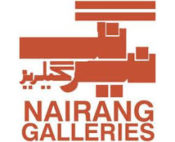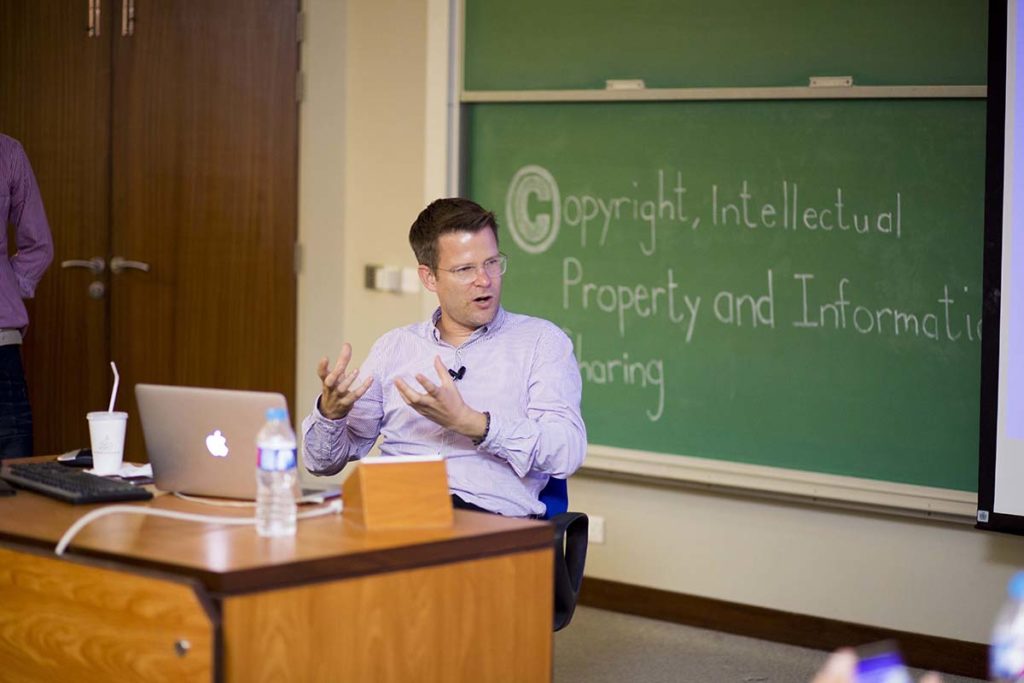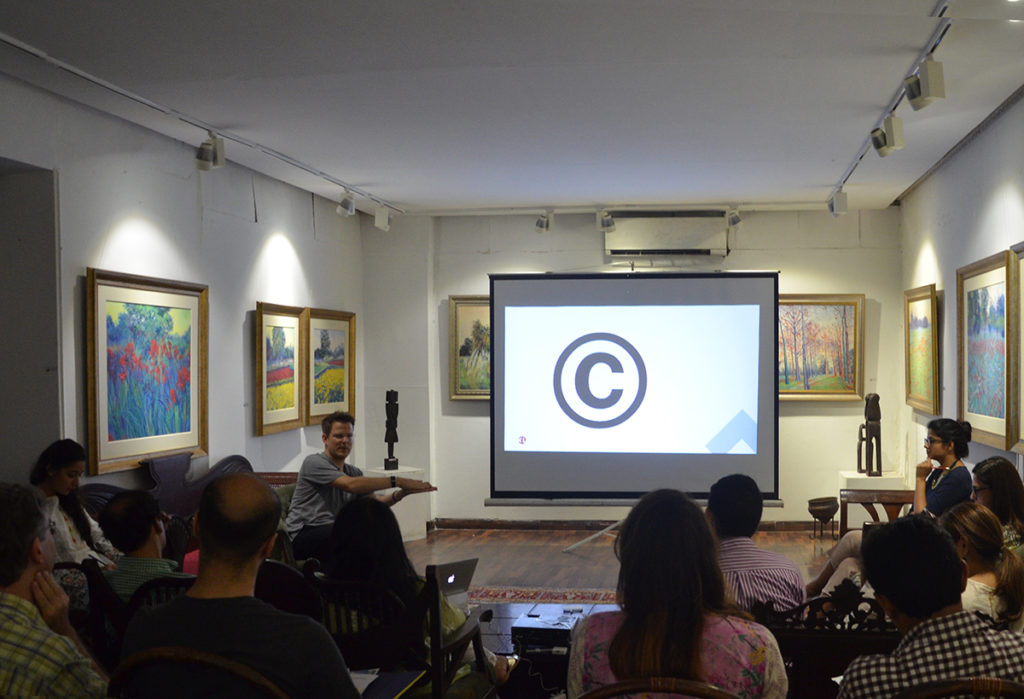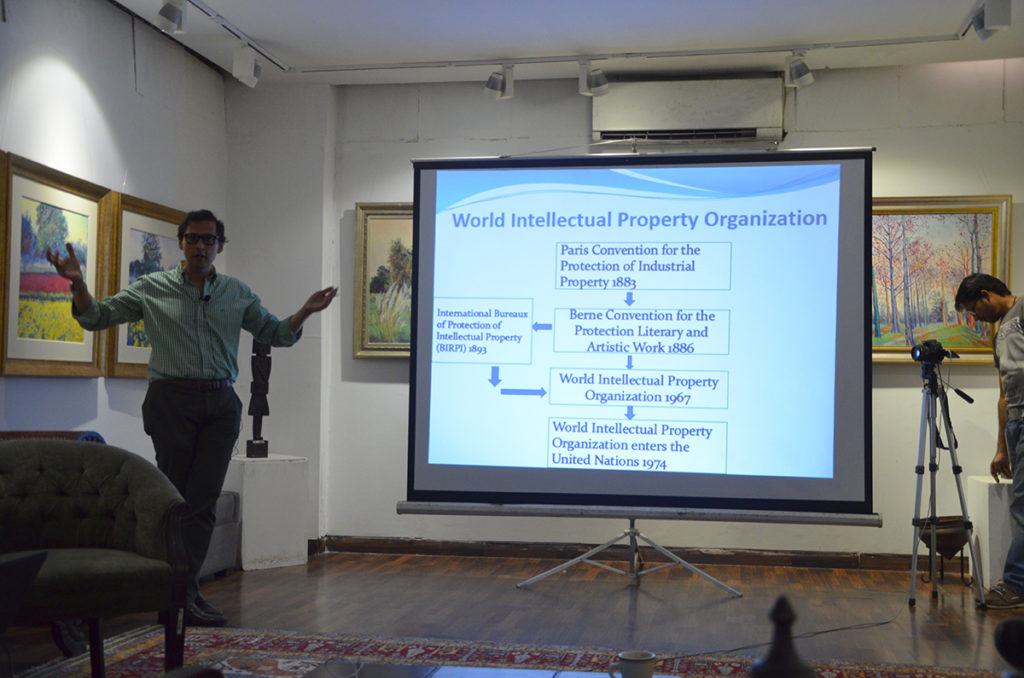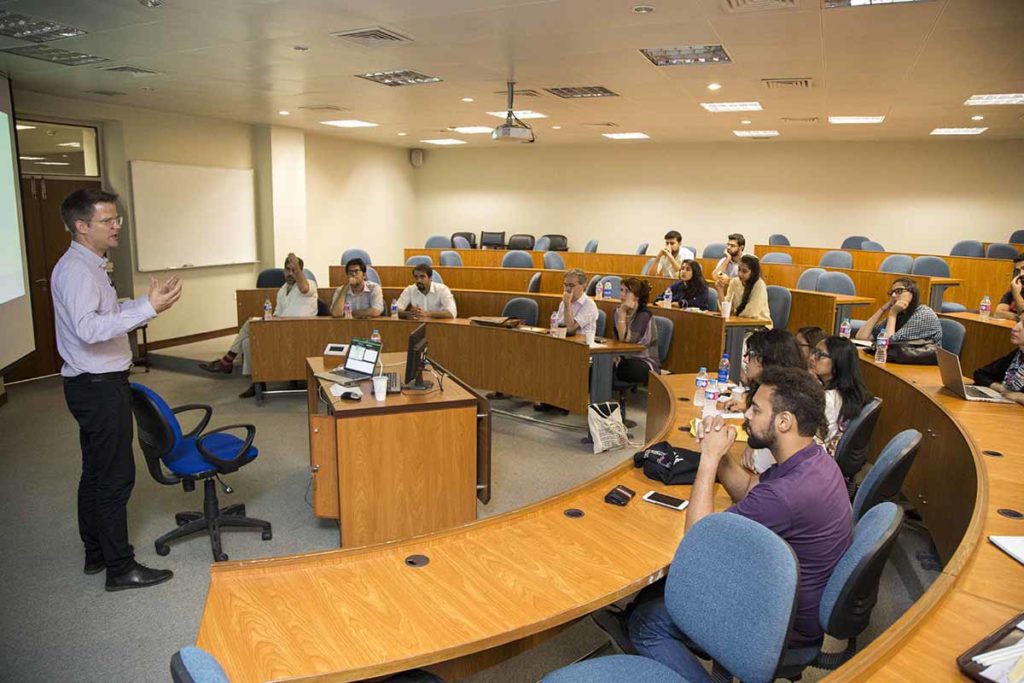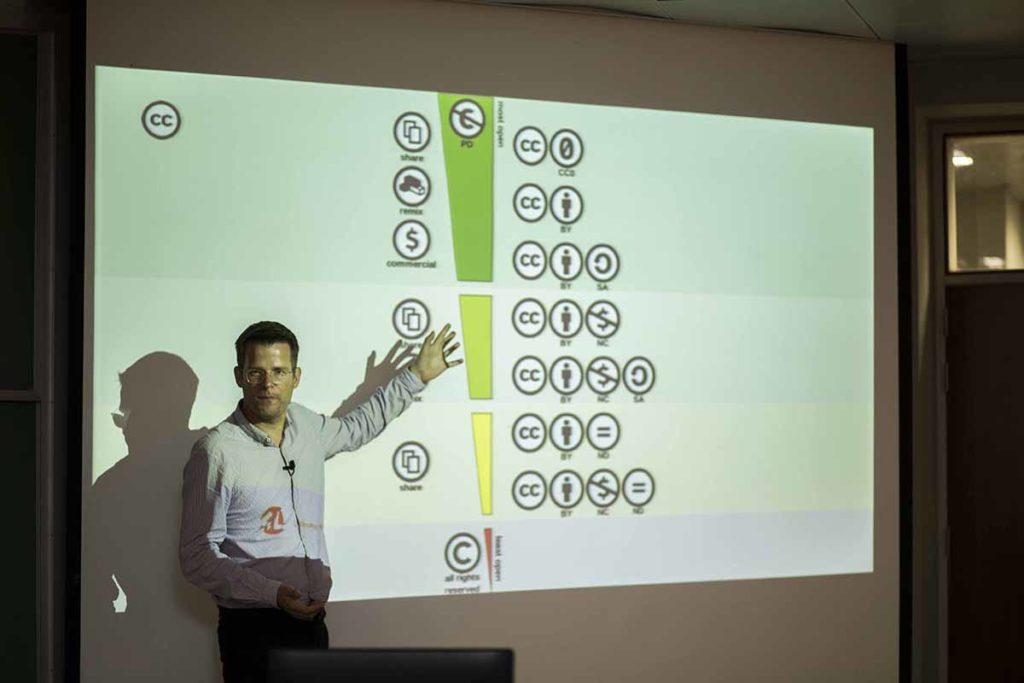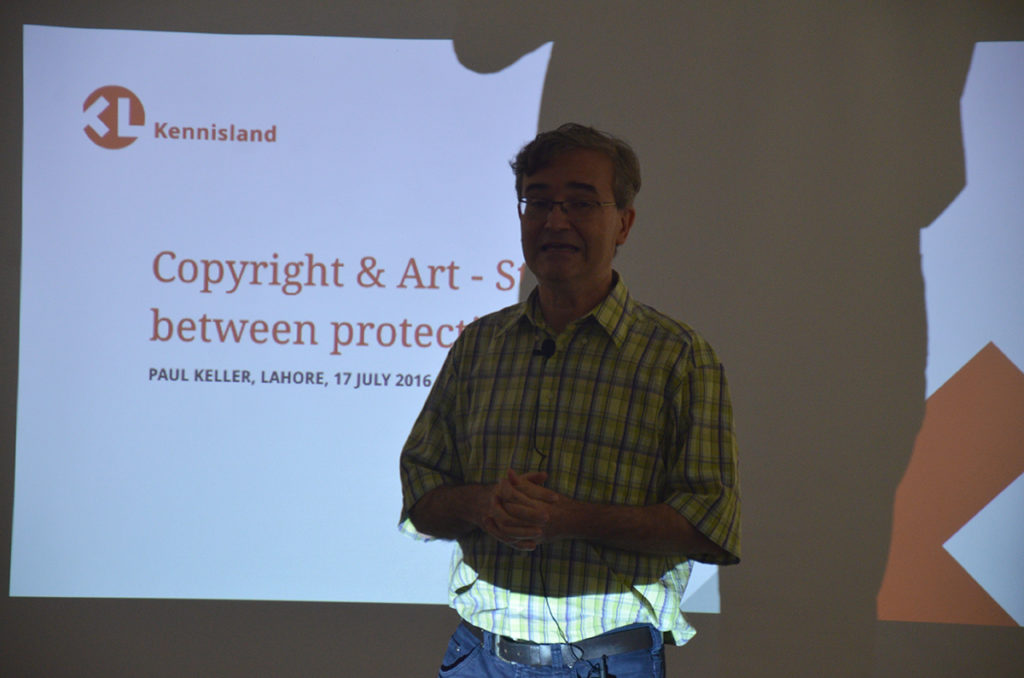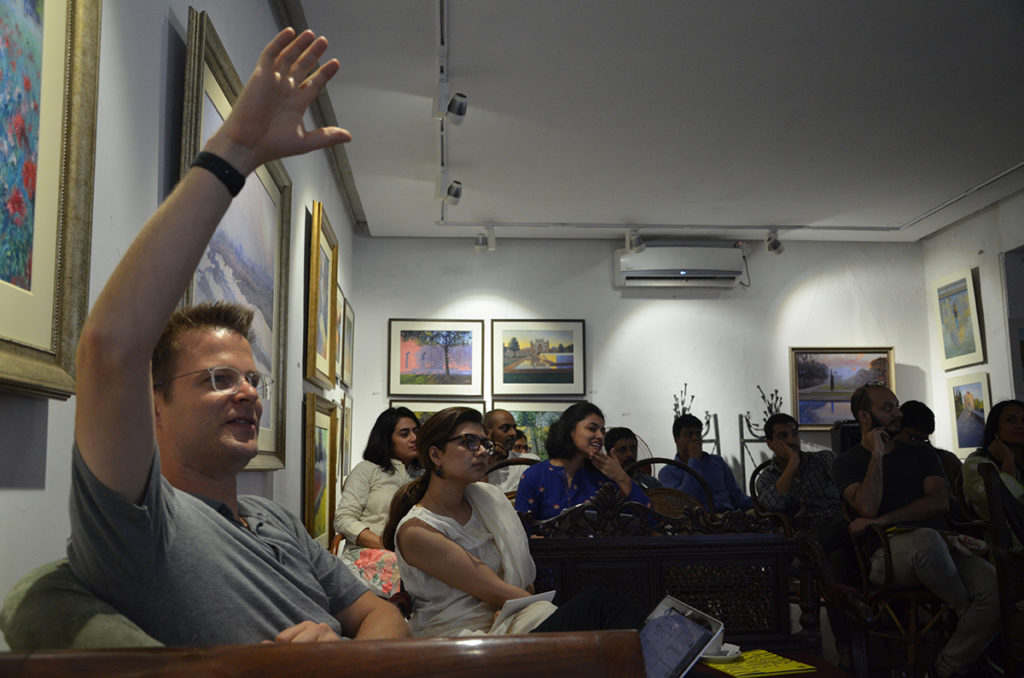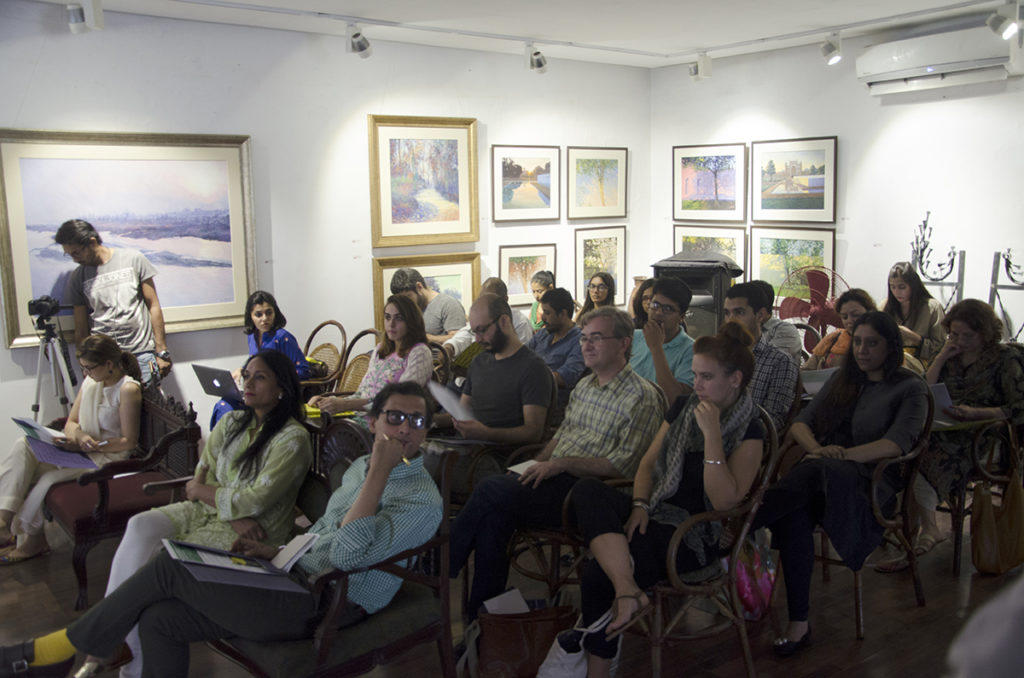Workshop | Copyrights, Intellectual Property and Information Sharing
WorkshopWith the aim to discuss copyrights, intellectual property, and information sharing in light of art and law in Pakistan, a three-day workshop was organized as part of Urbanities. It brought together eminent speakers Jawad Hassan (Senior Partner at Hassan, Qureshi and Mamdot), Paul Keller (Vice Chair of Kennisland and Public Project Lead for Creative Commons, Netherlands) and Rafay Alam (Environmental Lawyer and Founding Partner of Saleem, Alam and Co.).
The first session at the Nairang Art Gallery, abounded with various questions and debate around the oft-ignored, yet highly crucial matter of safeguarding one’s intellectual property. Keller’s in-depth discussion focused on the importance of copyrights, the effect of technology on methods of information storage, referencing and dissemination, and also the various challenges faced by creative individuals. Diverse examples from the fields of literature, painting and architecture served to illustrate the modern-day conundrum of protection of artistic work, both new and old. Hassan’s approach to the subject dealt with existing procedures and laws in Pakistan, along with the history of various types of intellectual property rights. Hoping to dispel any misconstrued notions of words like “copyright” and “publication”, he also chose to reiterate the meaning and identify the various types of works that merit protection. The audience was also introduced to existing Pakistani platforms and organizations like the IPO Dispute Resolution, and other processes that facilitate the protection of artistic works.
While the first day was more introductory in nature, the second day of the workshop, held at the Lahore University of Management Sciences (LUMS), with Keller and Alam was an elaborate session wherein Keller introduced the audience to the workings of Creative Commons, a non-profit organization dedicated to free and fair circulation of information in the public realm. It also provides creative individuals with licenses that help safeguard their work. The aim of the conversation was to encourage deliberation over how cultural heritage institutions operate in today’s rapidly digitizing world, and the various kinds of models that are possible to adopt in order to maximize common access to works in the public domain. With reference to Creative Commons, various public domains like Europeana, YouTube, MIT Open CourseWare and Flickr were also discussed. Keller advocated for unrestricted access, improved copyright rules, and generous sharing of information in order to develop a seamless system for the dissemination of knowledge and resources.
In the latter part of the workshop, Alam expounded on the importance of sharing information, and how undue censorship and privatization is detrimental to the development of a society. Discussing the Pakistani status quo, along with certain flawed laws and policies in place today, he stressed on the importance of both the significance of knowledge circulation and the damage that a society could incur if vital information is knowingly kept from the public.
Whereas the creation of universal archives, libraries and cultural institutions with digitized resources has made works widely available, the issues of copyright have become infinitely complex. In Pakistan, the subject has not received much attention and creative individuals are not wholly aware of the intricacies of the laws and processes associated with it. An engaging question and answer session ensued at the end of the workshop, serving to both enlighten as well as encourage creative practitioners present in the audience to consider the issue with reference to their own work and experiences.
Video recordings of the workshop can be viewed on YouTube at the following links:
1.Copyright, Intellectual Property and Information Sharing | Day 2 | Part 1
2.Copyright, Intellectual Property and Information Sharing: Art & Law
Paul Keller is Vice-Chair of Kennisland, an Amsterdam-based think-tank focused on innovation in the knowledge economy. Mr. Keller is also Public Project Lead for Creative Commons, Netherlands and a leading expert on open-licensing systems in the cultural heritage sector. From 2009 to 2013, Keller has been Creative Commons’ Collecting Societies Liaison. In this role, he has been instrumental in negotiating pioneering cooperations between Creative Commons and various collective rights management organisations. Keller also serves as a board member for Dutch Culture that aims to strengthen the Dutch arts, culture and heritage sector by promoting international collaboration.
Jawad Hassan Advocate Supreme Court is the Senior Partner at Hassan,
Qureshi & Mamdot and has over twenty three years of experience in
contentious matters including litigation in the Superior Courts of Pakistan
as well as regulatory forums in Pakistan including the SECP, CCP, Tax
Tribunals, NIRC, FST, FTO, Banking Ombudsman and the Environment Tribunal.
Mr. Hassan has served as an Additional Advocate General of the Punjab at the
Supreme Court of Pakistan, Islamabad. He has also successfully handled
the landmark cases on constitutional matters before the Honourable Chief
Justice of Pakistan.
Apart from his specialization in commercial, oil and gas, energy, banking,
tax, litigation and environment work, Mr. Hassan has extensive experience in
the field of Intellectual Property rights. Mr. Hassan was also a lead
counsel in the seminal HUM TV case where the ‘moral rights’ of authors were
defined.
Rafay Alam is an Environmental Lawyer and Founding Partner of Saleem, Alam and Co., a law firm specializing in the energy, water, natural resource and urban development sectors. He serves on the boards of several government companies that focus on urban services. Alam is the Vice President (Punjab) of the Pakistan Environmental Law Association, the General Secretary of the Public Interest Law Association of Pakistan and member of the Board of the Citizens Archive of Pakistan (CAP). Alam believes in the right to mobility and the inviolability of the right to public spaces; to this end he has been involved with a number of landmark public interest cases on a pro-bono basis. He lives in Lahore with his wife and daughter, and on the weekends, helps organize Critical Mass Lahore, a cycling initiative aimed at raising awareness about these issues.
LBF facilitates and provides crucial support for experimental, socially contextualized and independent art projects.

